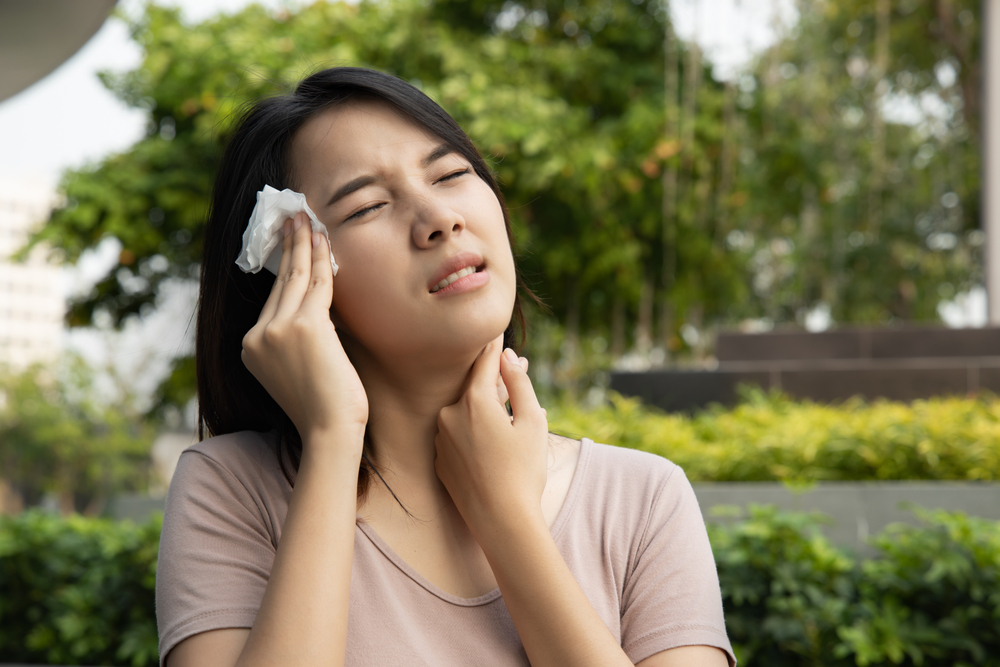
Too much moisture in the air can make you feel sticky and uneasy, and it may also be a factor in sinus issues. Many individuals experience intensified sinus issues during humid weather, with conditions like sinus infections becoming more prevalent. Sinusitis, also referred to as sinus infections, develops when the sinuses become swollen due to an infection or irritation, and increased humidity can aggravate this situation. In this post, we’ll discover how humidity impacts sinus health, the symptoms to look out for, and tactics to safeguard your sinuses from the discomfort of excess humidity in the air.
Recognizing sinus infections: Symptoms you shouldn’t ignore
Sinus infections, or sinusitis, are prevalent and can disrupt day-to-day life, particularly throughout the humid months. Sinus infections occur when the air-filled spaces in the skull, known as sinuses, become congested and irritated as a consequest of excessive mucus accumulation. Various factors, including infections, microbial contaminants, or external stimuli, can cause this to occur.
Detecting a sinus infection early can mitigate the dangers of added health problems. Identify these warning signs:
- Nasal Congestion: If you have a plugged nose that won’t clear up, especially for more than 10 days, it may be a sinus infection.
- Pressure Headaches: Sinus inflammation might be encounter as a mild headache or feeling of pressure in the forehead, eyes, or cheeks.
- Tooth Aches: Inflammation of the sinuses can result in referred pain in the upper teeth due to the proximity of these teeth, creating pain or sensitivity.
- Relentless Sinus Congestion: A steady stream of mucus down the back of the throat or thick, sticky discharge is a common indicator of a sinus infection.
- Fever: If you have a low-grade fever together with other symptoms, it could indicate an infection.
If your symptoms linger for longer than a few days or are severe, it’s best to consult with a healthcare provider to get a proper diagnosis and treatment strategy.
The connection between sinus infections and humidity levels.
Humidity can play an unexpected role in the development and intensity of sinus infections. High amounts of moisture in the air do not directly result in sinusitis, but they can exacerbate the issue by promoting conditions that support infection and inflammation. This is how:
- Damaged Cilia: The little hair-like structures in your nose play a crucial part in catching and clearing out hazardous bacteria, allergens, and unwanted mucus, helping eliminate pathogens. However, when exposed to excive moisture, these tiny hair-like structures can become less effective at moving mucus out of your sinuses, leading to a higher danger of infection.
- Higher moisture levels can lead to a surge in allergy-causing substances, including mold and dust mites, which multiply rapidly in damp conditions. Exposure to these allergens can activate sinus irritation, resulting in swelling and congestion, which in turn increases the risk of experiencing a sinus infection.
What is the ideal humidity level for sinus health?
Preserving the right level of moisture in the air is essential for keeping your sinuses healthy. Even though your body’s innate defenses, including mucus and cilia, need a certain level of moisture to work well, excessive humidity can lead to issues.
Tracking the humidity and dew points outdoors can assist in determining when to act. If the humidity is high, you may want to think about reducing exposure or taking steps to maintain the moisture balance inside your house.
How to safeguard your sinuses from humidity-induced infections
To protect your sinuses against the adverse impact of humid surroundings, think about incorporating a few preventive strategies. Here’s what you can do to minimize the danger of sinus infections:
- Limit Allergen Exposure: During high-humidity days, try to remain indoors as much as possible to steer clear of allergens like pollen and mold, which thrive in moist settings. If you do venture outdoors, attempt to avoid wooded areas or spots with high mold growth.
- Use a Saline Nasal Spray: Using a spray that consists of saline can help maintain moisture in your nose without developing a setting that nourishes infection. This supports the cilia’s ability to eliminate mucus and pathogens more effectively.
- Manage Interior Humidity: Use a dehumidifier indoors, particularly during humid months, to help maintain a comfortable and healthy air quality. Preserve a balanced humidity level to prevent the growth of bacteria and mold.
When to see an ENT specialist
If recurring or intense sinus issues persist during periods of high humidity, it may be beneficial to seek the expertise of an otolaryngologist, a doctor specializing in the treatment of ear, nose, and throat disorders. A specialist in ear, nose, and throat care can evaluate your sinus structure and pinpoint any underlying health concerns that might be exacerbating your symptoms, and then advise effective treatments to improve your respiratory comfort. They might suggest medications, allergy treatments, or other approaches to reduce inflammation and prevent future infections.
Savoring summer without sinus discomfort
Sinus issues don’t have to be linked to the summer season. Comprehending the impact of humidity on your sinus health and implementing tactics to manage it can help you have a more comfortable season free from sinus infections. Whether through preventive measures at home, lifestyle changes, or professional care, you can reduce the risk of infection and maintain sinus health year-round.
It is essential to speak with a reliable ENT specialist for help with managing humid conditions or dealing with ongoing sinus issues. They provide customized treatment solutions developed to suit your individual requirements, helping in maintaining the health of your sinuses and ensuring an enjoyable summer.
Get in touch with us to schedule an appointment today.